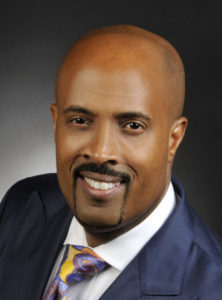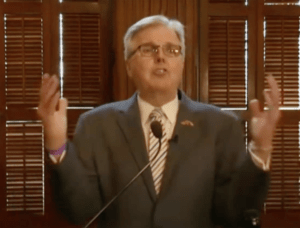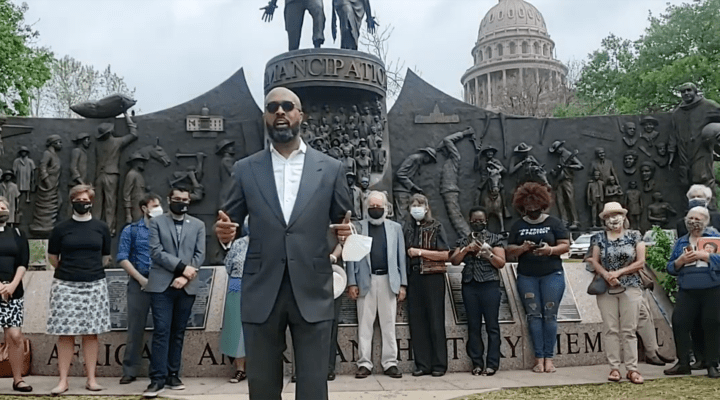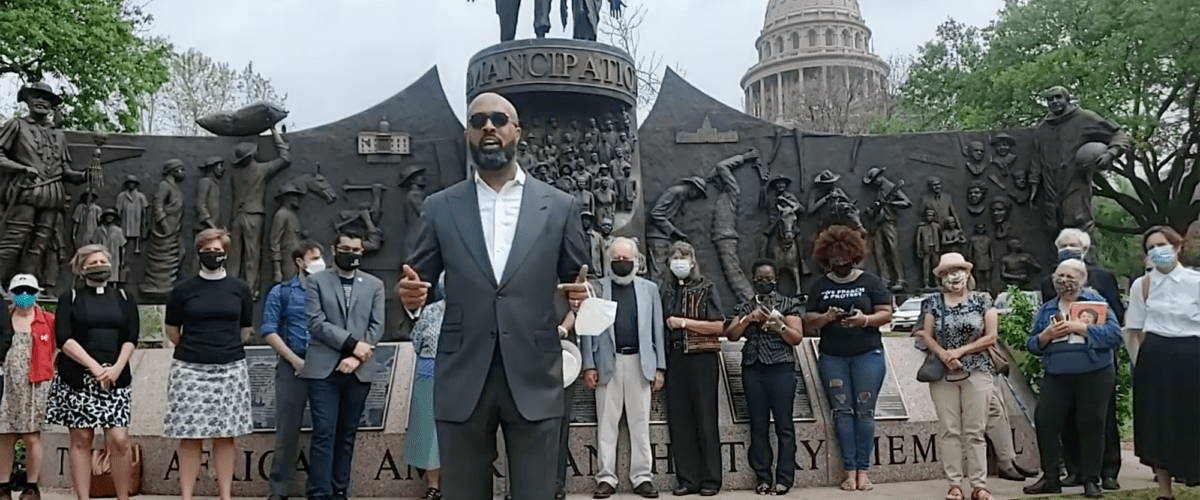Some Texas legislators want to outdo Georgia and Arkansas with a combination of bills restricting transgender teens and voting access for poor and minority citizens.
The Texas bills — four concerning transgender health care, six concerning transgender athletes and two that seek to restrict voting access — mirror a national trend this legislative session as Republicans in statehouses across the country are advancing often similar bills on these controversial issues.
A third trend among the states is bills that seek to grant churches and religious organizations almost blanket immunity from public health restrictions such as have been implemented during the coronavirus pandemic. Across all 50 states, more than 8,000 bills somehow related to coronavirus have been introduced. The religious exemption bills fall within that broader category.
Across all 50 states, more than 8,000 bills somehow related to coronavirus have been introduced.
Georgia made international headlines with its rapid passage of voting restriction bills that critics say target Black voters who turned the state toward a slim Democratic majority in the last elections. Arkansas made international headlines with its rapid passage of bills that restrict health care access for transgender persons and allow medical professionals to deny services to anyone based on their own ethics.
Now, Texas legislators are attempting to imitate both Georgia and Arkansas — despite fierce blowback from business leaders and civil rights groups in both states.
Clergy protest voting bills
Some Texas faith leaders gathered outside the state Capitol April 7 to protest Senate Bill 7 and House Bill 6, which would ban drive-through voting, shorten early voting hours, allow mail voting applications to be sent only to voters who request them and require disabled voters to prove their disability with documentation from a physician or the federal government. Critics say the bills are a direct attack on Harris County, which includes parts of Houston and has one of the state’s largest blocs of minority voters.

Frederick Haynes
“We have those in leadership — in Texas government — who have in their ideological DNA the same mindset of those slave masters who denied the humanity of Black people,” said Frederick Haynes III, pastor of Friendship-West Baptist Church in Dallas. “The same mindset of those individuals who upheld Jim and Jane Crow segregation.”
Haynes accused Texas Republicans of using “election integrity” as an excuse to restrict Black votes.
The day before, Texas Lt. Gov. Dan Patrick held a fiery news conference in which he declared that he and his fellow conservatives are absolutely not racists and anyone who says they are is a liar.

Texas Lt. Gov. Dan Patrick news conference.
The Texas Tribune reported that Patrick, “yelling at times,” objected to suggestions that Republicans are deliberately targeting voters of color in Democratic strongholds.
“Senate Bill 7 is about voter security, not about voter suppression, and I’m tired of the lies and the nest of liars who continue to repeat them,” Patrick said. “You’re questioning my integrity and the integrity of the governor and the integrity of the 18 Republicans who voted for this when you suggest that we’re trying to suppress the vote. You are, in essence, between the lines, calling us racist, and that will not stand.”
Transgender health and sports bills
Meanwhile, this week, four bills that would restrict access to health care for transgender persons in Texas are getting a hearing in Austin. These include Senate Bill 1311, which would allow the state to revoke the license of any medical professional who helps a transgender youth under age 18 with any form of transitional treatment. Although the bill specifically targets surgical procedures — which are exceptionally rare among minors — it also would ban pharmaceutical interventions such as puberty blockers, which are more often used with transgender minors.
Texas Republicans also have joined their colleagues in other states with bills seeking to restrict transgender participation in athletics — an issue critics have called a solution in search of a problem.
In Texas, House Bill 1424 mirrors the controversial language adopted in Arkansas that would allow health care professionals to deny care.
House Bill 1458, for example, seeks to limit gender-specific high school athletic competition to the gender assigned at birth to student athletes. The same is true for Senate Bill 29, which has passed out of committee and now awaits action by the full Senate.
Also in Texas, House Bill 1424 mirrors the controversial language adopted in Arkansas that would allow health care professionals to deny care to anyone based on the provider’s own code of morality or ethics.
Business pushback
The National Collegiate Athletic Association, meanwhile, sent up a warning flare to Texas and other states considering anti-transgender athlete legislation. The NCAA board of governors said April 12 that it will only hold college championships in states where transgender student-athletes may participate without discrimination.
“Inclusion and fairness can coexist for all student-athletes, including transgender athletes, at all levels of sport,” the NCAA said. “Our clear expectation as the association’s top governing body is that all student-athletes will be treated with dignity and respect. We are committed to ensuring that NCAA championships are open for all who earn the right to compete in them.”

Michael Dell
The Republican agenda of targeting transgender teens and voting access continues to generate intense opposition from business leaders as well. In Texas, Dallas-based American Airlines and Austin-based Dell Technologies issued statements denouncing bills that seek to restrict voting access.
“Governments should ensure citizens have their voices heard. HB6 does the opposite, and we are opposed to it.”
Michael Dell, founder of Dell Technologies, took to Twitter to express his opposition to Texas House Bill 6: “Free, fair, equitable access to voting is the foundation of American democracy. Those rights — especially for women, communities of color — have been hard-earned. Governments should ensure citizens have their voices heard. HB6 does the opposite, and we are opposed to it.”
Religious exemptions
Missouri now is among the array of states considering legislation that would grant religious organizations broad exemptions to government oversight even in times of public health crisis such as the coronavirus pandemic.
Missouri House Bill 1416 carries the title “Fundamental Freedom from Government Act.” Unlike some other state bills that specifically mention public health emergencies, the Missouri bill gathers a basketful of hot-button issues for religious conservatives.
Its opening line states: “Neither this state nor any political subdivision thereof shall infringe or unnecessarily restrict any citizen’s fundamental rights to freely exercise his or her religion and to keep and bear arms.”
“Neither this state nor any political subdivision thereof shall infringe or unnecessarily restrict any citizen’s fundamental rights to freely exercise his or her religion and to keep and bear arms.”
While addressing the right of religious organizations to hold public gatherings even during “declared emergencies,” it also addresses “the right of personal privacy to use sex-specific restrooms” and “the fundamental right of every citizen to keep and bear arms, ammunition, and accessories typical to the normal function of such arms in defense of home, person, family, and property.”
The Missouri bill also would demand priority court access for any claims of violations of these expressions of religious exercise.
‘Religious exemptions on steroids’
The ACLU, in monitoring the slate of religious exemption bills under consideration across the nation, said this year’s batch seeks to enact “religious exemptions on steroids.”
“Under the guise of protecting the ability to worship during emergency disasters, these bills could give religious organizations blanket immunity from all civil and criminal liability — as long as they claim to be exercising their faith while engaging in the unlawful conduct,” wrote Heather Weaver, ACLU senior staff attorney, and Daniel Mach, ACLU director.
Specifically citing bills in Arizona, South Carolina and Montana, the ACLU officials warned that “granting religious organizations these broad, unprecedented and frightening exemptions from the law could result in untold harm for states and communities across the board.”
“These religious exemptions are so unprecedented and radical that it’s not surprising that supporters are hiding them.”
The desired exemptions are so broad, they declared, that religious organizations could “claim immunity from criminal prosecution and civil liability for the sexual abuse or physical harm of children,” could “be shielded from the consequences of violating state nondiscrimination laws that conflict with their religious beliefs” and could freely violate fire codes by exceeding capacity limits during religious services.
This is a First Amendment problem, the ACLU leaders asserted. “Exempting religious organizations from nearly every law and shielding them from civil and criminal liability — no matter the harm to others — is the type of religious preference that the U.S. Constitution forbids.”
“These religious exemptions are so unprecedented and radical that it’s not surprising that supporters are hiding them in bills that, at first glance, appear to simply address the right to hold worship services during an emergency,” Weaver and Mach wrote.
Related articles:
‘Pandemic acknowledges no religious exemption,’ interfaith group warns state legislatures
Anti-transgender bills introduced in more than a dozen state legislatures


